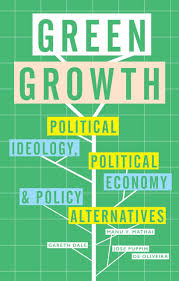In Green Growth: Ideology, Political Economy and the Alternatives, editors Gareth Dale, Manu V. Mathai and Jose Puppim de Oliveira bring together a range of contributors to challenge the green growth paradigm and outline alternative approaches. This is a rigorous and compelling book that Geoff Goodwin recommends to all those looking to better understand our current environmental crisis.
Green Growth: Ideology, Political Economy and the Alternatives. Gareth Dale, Manu V. Mathai and Jose Puppim de Oliveira (eds). Zed Books. 2016.
 While there is broad consensus on the existence of a global environmental crisis, there are diverging opinions on the scale of the social, political and economic change required to tackle it. Placing their faith in market mechanisms, entrepreneurial spirit and technological upgrading, proponents of ‘green growth’ suggest relatively minor modifications to the neoliberal model are all that is necessary. Others see that the roots of the crisis run deeper into the capitalist system and claim more radical changes are required to shift the world economy onto a truly sustainable path. The contributors to this important collection of essays, Green Growth: Ideology, Political Economy and the Alternatives, fall squarely within the second camp. Coming from a range of disciplinary and ideological backgrounds, the authors offer their own analysis of the environmental crisis, but are united in the belief that the green growth approach is dangerously misguided and in the ‘conviction that the theoretical and, especially, the practical development of alternatives is imperative’ (19).
While there is broad consensus on the existence of a global environmental crisis, there are diverging opinions on the scale of the social, political and economic change required to tackle it. Placing their faith in market mechanisms, entrepreneurial spirit and technological upgrading, proponents of ‘green growth’ suggest relatively minor modifications to the neoliberal model are all that is necessary. Others see that the roots of the crisis run deeper into the capitalist system and claim more radical changes are required to shift the world economy onto a truly sustainable path. The contributors to this important collection of essays, Green Growth: Ideology, Political Economy and the Alternatives, fall squarely within the second camp. Coming from a range of disciplinary and ideological backgrounds, the authors offer their own analysis of the environmental crisis, but are united in the belief that the green growth approach is dangerously misguided and in the ‘conviction that the theoretical and, especially, the practical development of alternatives is imperative’ (19).
Green Growth takes a step in this direction by offering a rigorous evaluation of the green growth paradigm and proposing alternative routes out of the crisis. The opening chapters are dedicated to explaining the roots, contradictions and limitations of the approach. Ulrich Hoffmann offers the most accessible and comprehensive critique. He reveals the stark tension between efforts to reduce global carbon intensity levels on the one hand, and to accelerate global capitalist development on the other. Put simply, his analysis suggests that unless global warming is allowed to rise to alarming levels, low income countries will either have to abandon efforts to achieve comparable levels of income and consumption to high income nations or find alternative ways to develop.
The implications of the environmental crisis for global patterns of development are also highlighted by Larry Lohmann. Viewing green growth as the latest phase in the historical attempt to externalise, quantify and commodify nature, he claims that the main beneficiaries of this process have been advanced industrialised states, which have secured ‘innovative colonial rents’ through the creation of ‘new natures’ (63). Green growth emerges as a mechanism to embed existing global imbalances in wealth, income and power.
 Image Credit: (c_ambler CC BY 2.0)
Image Credit: (c_ambler CC BY 2.0)
While countries in the Global North appear to have been the primary beneficiaries of green growth, nations in the Global South have engaged actively in the process. Brazil has been one of the most prominent participants. This country is a particularly interesting case as over the last decade it has made headline improvements in energy production and environmental conservation while also registering notable declines in poverty and inequality. Has Brazil therefore forged a path that other nations in the Global South should follow? The chapter by Ricardo Abramovay suggests not.
Abramovay argues that rather than move towards sustainable and equitable development, Brazil has fallen into a ‘green growth trap’ by focusing narrowly on raising income levels, investing in large-scale hydroelectric plants and promoting biofuel production and technology. The environmental dimensions of his argument rest on the characteristics of the hydroelectric and biofuel industries. He claims that while they have contributed towards decarbonising the economy, they have also distanced it from the ‘frontiers of technology’ (160). Centralising energy generation and distribution through hydroelectricity has restricted the possibility of decentralising energy supply and producing renewable energy at the local level. Meanwhile, investing in biofuels has limited technological upgrading in the automobile industry: ‘adopting a fuel that does not emit net greenhouse gases in no way diminishes the inefficiency and the paucity of innovation that typifies the automobile sector and eventually affects economic life as a whole’ (161). The author therefore claims that green growth will not dynamise the economy and trigger a new wave of rapid economic expansion. Recent macroeconomic data from the country lend support to this view. Since 2013, economic growth has plunged and unemployment has soared. While the reasons for Brazil’s prolonged economic (and political) decline are multiple and complex, the slump casts doubt over the ability of green growth policies to deliver consistently high levels of economic growth.
The wider ecological challenges that countries in the Global South face are also illustrated in the illuminating chapter co-authored by Joan Martinez-Alier. The authors claim that the economies of India and Latin America have not ‘dematerialised’ in absolute or relative terms, and while material extraction (i.e. minerals, biomass, fossil fuels) appears to be approaching its peak in Latin America at fifteen tonnes per capita/year, it is likely to double or treble in India in the coming decades, reaching ten or fifteen tonnes per capita/year. Remarkable levels of material extraction have underpinned economic growth in the two regions over the last five decades, and there is little to suggest this pattern will change without radical social, political and economic change.
What are the possibilities of these changes materialising? Sensibly, Green Growth steers clear of making predictions. However, it does provide insight into ‘emerging alternatives’. The most compelling case comes from Ashish Kothari, who claims local ecological struggles in India point toward the possible emergence of a ‘radical ecological democracy’ in the country. Without romanticising or homogenising these diverse struggles, Kothari shows how communities are challenging existing patterns of development and taking control of resources and environments at the local level. He claims that the emerging paradigm rests on four main pillars: i) decentralising decision-making to communities, creating participatory forms of local democracy and establishing new governance structures at the regional level; ii) localising the economy and subjecting it to democratic control; iii) removing ‘traditional’ and ‘modern’ barriers to inclusion, diversity and equality; and iv) creating new knowledge systems which transcend formal dichotomies (e.g. natural/human). This paradigm therefore contrasts sharply with green growth, which attempts to make marginal environmental improvements while remaining within existing social, political and economic structures. In doing so, it offers the prospect of a ‘have your cake and eat it’ route out the global environmental crisis for proponents of neoliberal capitalism. While not without limitations, Green Growth makes a compelling case to challenge this discourse and search for alternative ways to tackle the crisis. The volume is required reading for anyone who wants to understand the most pressing concern of our time.
This review originally appeared at the LSE Review of Books.
Please read our comments policy before commenting.
Note: This article gives the views of the authors, and not the position of USAPP– American Politics and Policy, nor of the London School of Economics.
Shortened URL for this post: http://bit.ly/2ikaiJk
——————————————–
Geoff Goodwin – LSE International Development
Geoff Goodwin is a Fellow in International Development at the London School of Economics and Political Science. His current academic interests include agrarian change, decommodification, social movements and economic/development theory. He has spent the last few years investigating rural community water organisations in the Ecuadorian Andes.



